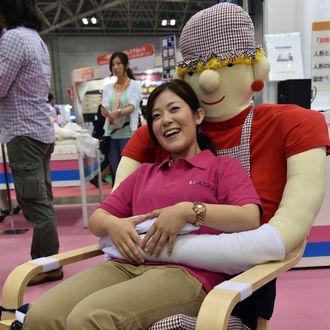
That sitting device you see above, Time reports, is a $419 “tranquility chair” currently on display at the Home Care and Rehabilitation Exhibition in Tokyo (where else?). The obvious first impressions upon seeing it are that it is (a) creepy; and (b) expensive. But it is also a useful illustration of an emerging, emotionally charged debate.
In short, countries like Japan that are facing so-called elder-booms are developing technology, including robots, that will help assist nursing-home employees and others care for old people. The megacute robot PARO is one example: One of its functions is to soothe the elderly in settings where there isn’t a human available. This notion of artificially soothing naturally makes some people uncomfortable, especially given that many of the elderly people for whom such technology is designed may suffer from senility and not fully understand that they are not petting or interacting with another living creature.
Sherry Turkle, an MIT professor who studies human-computer interaction, is one of the foremost critics of these sorts of technologies. “It’s not just that older people are supposed to be talking. Younger people are supposed to be listening,” Turkle told Live Science in 2013. “We are showing very little interest in what our elders have to say. We are building the machines that will literally let their stories fall on deaf ears.” Her broader argument, in short, is that to delegate the task of elder care to machines is to mortgage certain important human values.
The counterargument to this: Yes, in a perfect world every old person would have a living, breathing human there to comfort them, but that’s not the world we live in now and, given demographic patterns, definitely won’t be the world we live in in, say, 2130. In the real world, the choice is whether old people will sit in nursing facilities alone or with a toy or robot that helps bring them some comfort and happiness — in other words, it’s no choice at all.
The counter-counterargument to this: well, okay. But if we go down the robot path, aren’t we going to quickly not even try to ensure that old people are treated with dignity and have healthy interactions with younger people? Won’t there be a cruel and swift outsourcing of a role that’s been an important part of human culture and key to our empathic makeup forever?
And so on and so on. It’s a debate that will only heat up, and it’s composed of some rather wrenching questions that lack easy answers. Wherever we stand on the broader issues, though, we can all agree: There’s a pretty good chance that chair comes to life at night and murders people.




